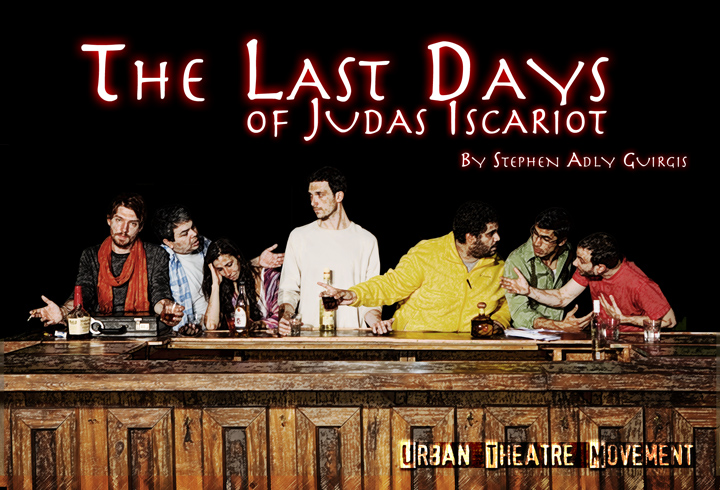
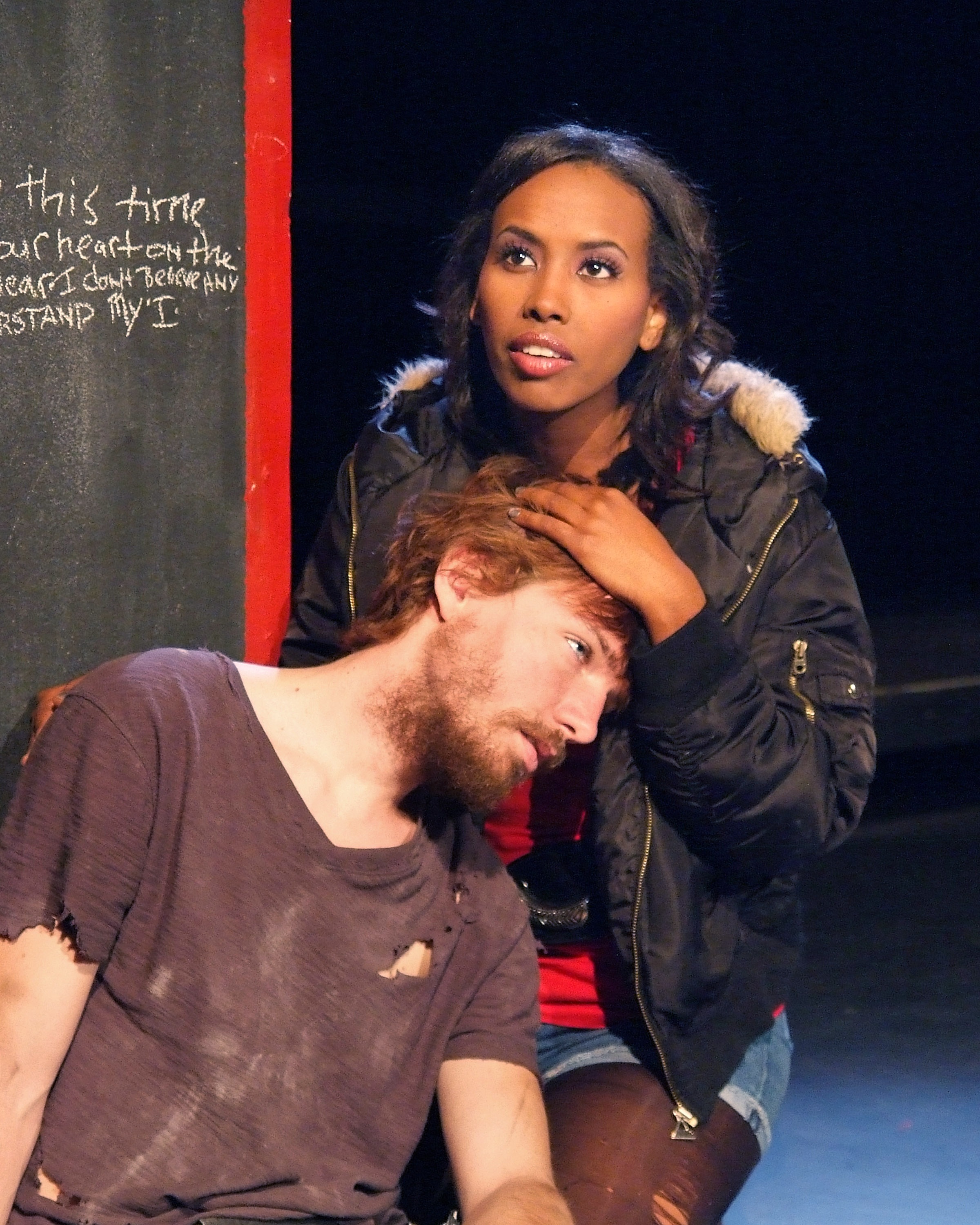
- Playwright, Stephen Adly Guirgis
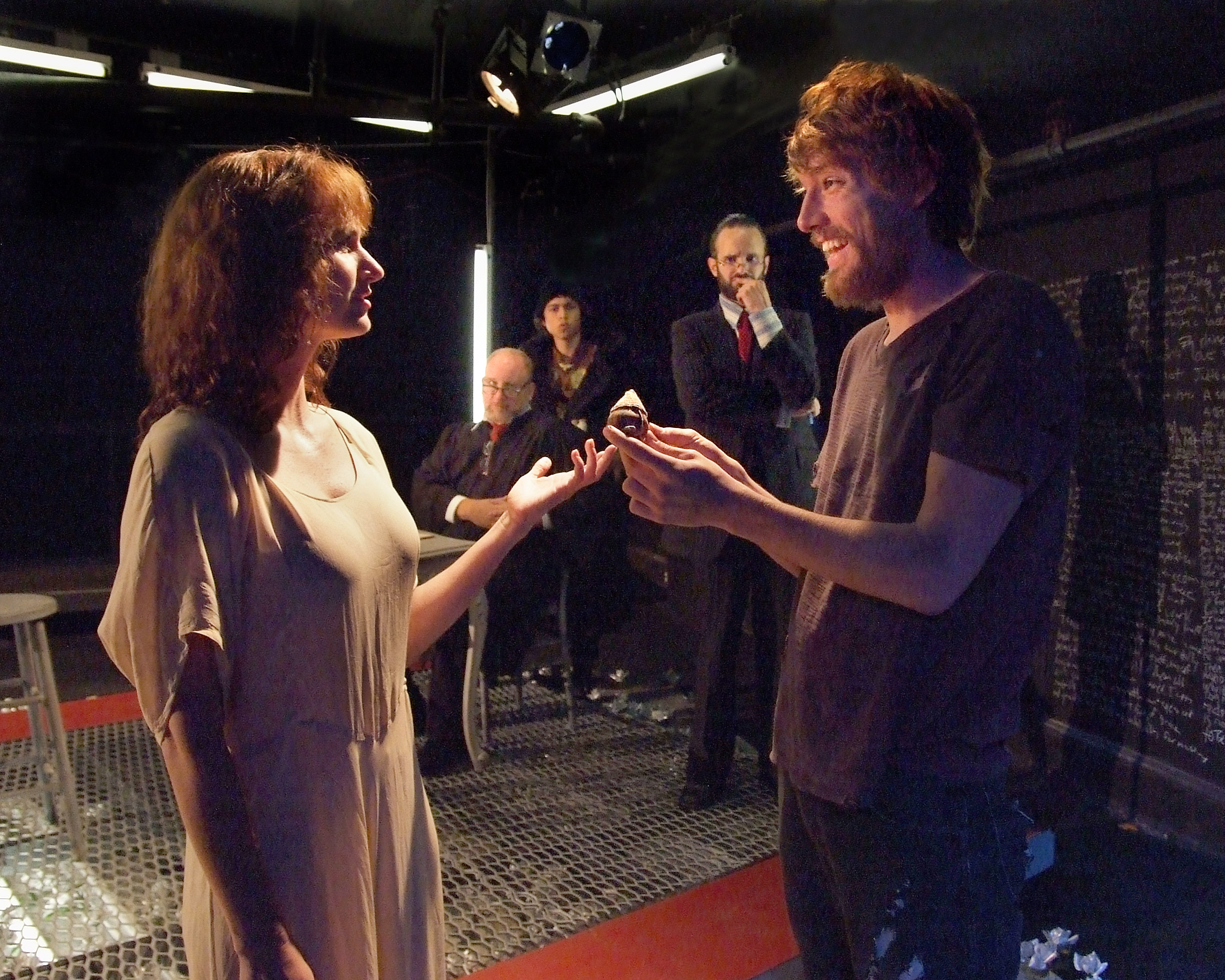
but it bears stating again." - LA Theatre Review
but it bears stating again.” - LA Theatre Review
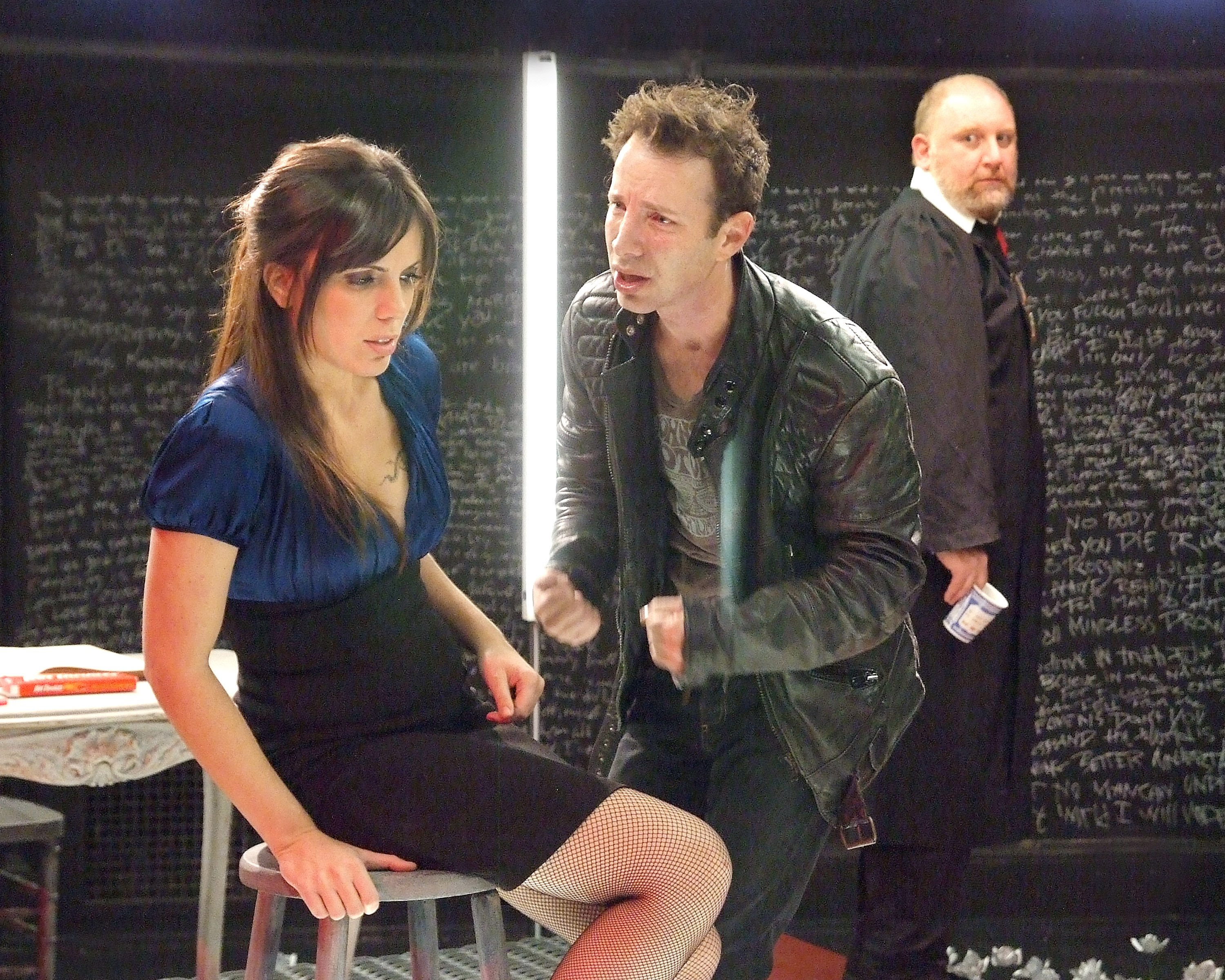
and outstanding performances." - Backstage
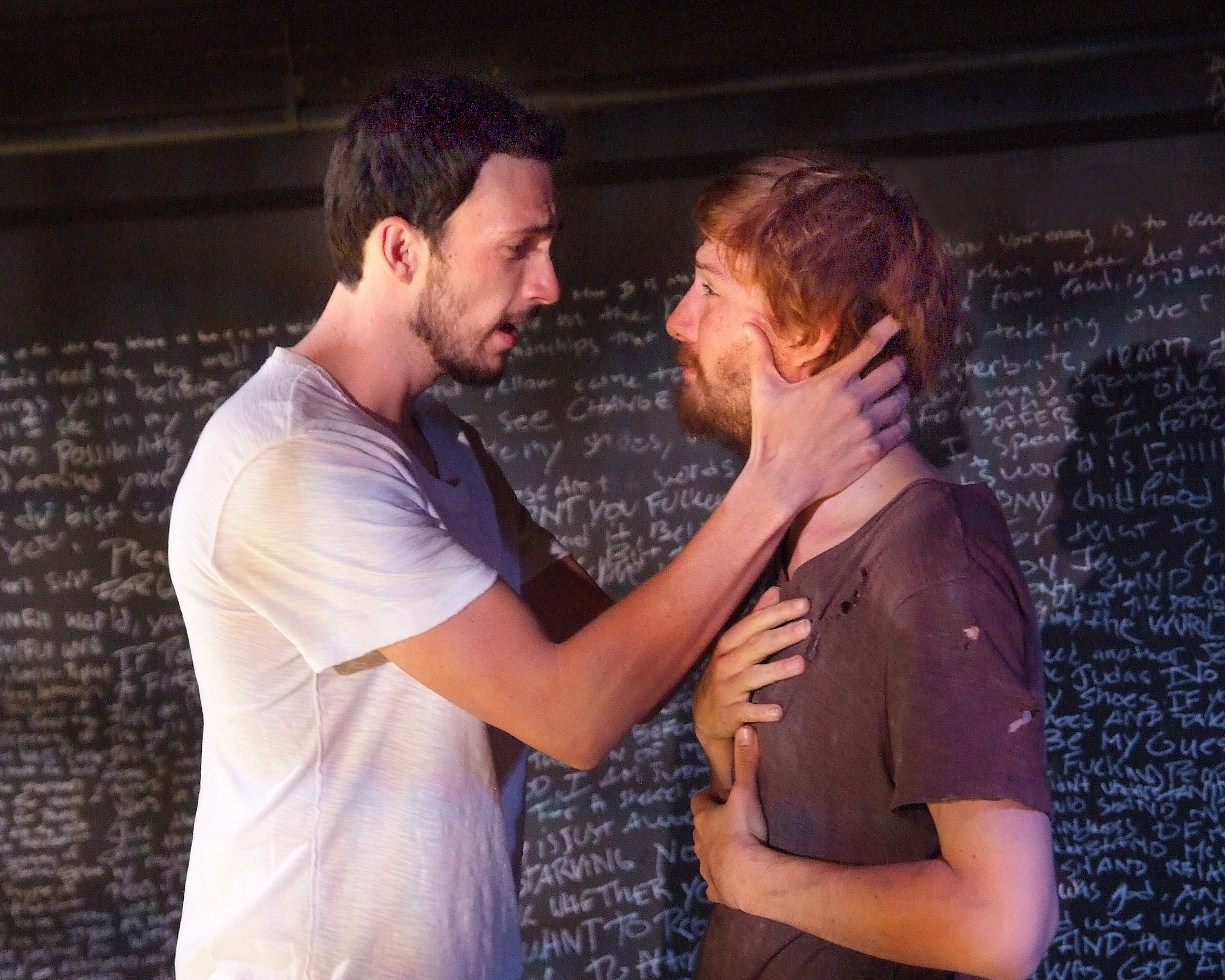
with a huge and sterling cast." - LA Weekly





Urban Theatre Movement
in association with Company of Angels presents
The Last Days of Judas Iscariot
by Stephen Adly Guirgis
directed by Jeremy Aluma
November – December 2010
at Company of Angels (Downtown Los Angeles, CA)
“full of heart, thought, and raucous vigor. I think Jesus would be proud.”
– Playwright, Stephen Adly Guirgis
“I’ve already stated that I think Jeremy Aluma is a talented director, but it bears stating again.” – LA Theatre Review
“director Jeremy Aluma has given it a terrific production, with a huge and sterling cast” – LA Weekly
“Director Jeremy Aluma’s rendition benefits from striking visual imagery and several outstanding performances.” – Backstage
“Aluma has directed an amazing and talented cast.” – Santa Monica Mirror
“Aluma’s rendition is a highly impressive performance.” – Daily 49er
“a wonderful treatment in the version directed by Jeremy Aluma” – Random Lengths
“The actors are exceptional throughout the production.” – Los Angeles Loyolan
“The 23-person cast all performs exceptionally well.” – Campus Circle
Starring …
*Jessica Culaciati as FABIANA AZIZA CUNNINGHAM
Aaron DuPree as BUTCH HONEYWELL
Lowam Eyasu as SAINT MONICA
Brighid Fleming as MATTHIAS OF GALILEE
Tony Gatto as JUDGE LITTLEFIELD
Stevens Gaston as SIMON THE ZEALOT
Christopher Gavilanes as SOLDIER 2
Amir Levi as SIGMUND FREUD
Angie Light as MOTHER TERESA
Israel Lopez as SAINT MATTHEW
Michelle Mania as HENRIETTA ISCARIOT
*Shyla Marlin as MARY MAGDALENE
Gilbert Martinez as SAINT PETER
Vincent Mentry as JUDAS ISCARIOT
*Nick Mills as YUSEF EL-FAYOUMY
Sharif Nasr as SAINT THOMAS
Samantha Parks as LORETTA
Charles Sanchez as BAILIFF
Fayna Sanchez as GLORIA
*Levi Sochet as SATAN
Adam Tsekhman as CAIAPHAS THE ELDER
Paul Tully as PONTIUS PILATE
Peter Weidman as JESUS OF NAZARETH
* Member of Actors’ Equity Association,
The Union of Professional Actors & Stage Managers in the United States
Produced by Urban Theatre Movement, Brenda Banda, Paul Tully, and Jeremy Aluma
Set Designers: Fred Kinney & Staci Walters
Lighting Designer: Jeff Brewer
Costume Designer: Cat Elrod
Sound Designer: Adam Smith
Stage Managers: Essence Brown & Melanie Torres
Technical Director: Geronimo Guzman
Production Manager: Brenda Banda
Assistant Director: Dion Chang
Props Master: Emmanuel Plascencia
Marketing Coordinator: Evelyn Arreaga
Hair & Make-Up Designers: Belinda Escalante, Veronique Khuu
Graphic Designer: Jonathan Lewis
Assistant Stage Manager: Christopher Gavilanes
Accent Coach: Andrew Bloch
Assistant Light Designer: Kalen Cobb
Fight Choreographer: Aaron Dupree
Yoga Instructor: Jazmine Aluma
Marketing & Publicity Assistants: Tony Bartolone, Shanelle Moore
Executive Producers: Judd Azoulay, Rosa Banda, Mozaic Theatre
Production Assistants: Samantha Cloonan, Roger Mason, Amery Thao
Scenic Crew: Jon Duran, Isabel Davila, James Gil, Hugo Martinez, Shanelle Moore, Joel Venegas, Jose Za Zueta
Over 2,000 years ago, in the land of Judea, the apostle Judas Iscariot committed the greatest act of betrayal the world has ever known. Stephen Adly Guirgis uses this timeless tale as the template for his courtroom drama set in purgatory, but this verdict and vernacular comes straight from the gritty, urban streets. Which begs the question, are these underserved communities any different from what we all fear most…hell? This fascinating play is not merely a religious diatribe, as witnesses like Mother Teresa, Sigmund Freud, Pontius Pilate and Satan take the stand we realize its messages of free will, responsibility, faith, fate and forgiveness are all universal. With the world evolving and the economy sinking, values and morals become even more important for every one of us to hold on to. We each possess qualities that we believe in, but in the world of Judas Iscariot the characters hold these values so close, so sacred that everything else is dust. All we can do is watch, learn and try to understand that in terms of humanity, Caiaphas, Pilate, Satan, Judas and Jesus are all equal.
Stephen Adly Giurgis sets his play in Purgatory, where Judas is on trial for his betrayal of Jesus, with events and characters filtered through a decidedly modern, urban sensibility. For most of Act 1, it’s engrossing stuff, but Giurgis’ tone grows uncertain, and he seems to be playing both ends against the middle: After establishing an irreverent, sassy, revisionist tone, he veers into a reverent, earnest mode. And the piece goes on too long, well past the point of diminishing returns. Fortunately, director Jeremy Aluma has given it a terrific production, with a huge and sterling cast. Tony Gatto shines as the irascible judge, Nick Mills is a flamboyant prosecuting attorney and the defense attorney played by Jessica Culaciati defends her client by indicting everybody else, from Mother Teresa (Angie Light) to Caiaphas the Elder (Adam Tsekhman) and Pontius Pilate (Paul Tully). Levi Sochet’s Satan is a smooth, glad-handing hipster; Lowam Eyasu is a Saint Monica with attitude; and as Judas, Vincent Mentry gives texture and credibility to a role that is largely passive until near the end. Fred Kinney and Staci Walters provide the fancifully handsome set, with ominous sound design by Adam Smith
– Neal Weaver
As is usually the case, Jeremy Aluma and the Urban Theatre Movement’s latest production was incredibly well mounted. The set was intriguing and evocative, the lighting was effective, the direction was confident and innovative, using an untraditional space very well, and the acting, for the most part, was superior. The problem I had with the evening, then, was with the play itself.
The Last Days of Judas Iscariot, written by Stephen Adly Guirgis, seems to be three separate plays. The first is a dark, biting, very funny political and religious satire in which Purgatory, which transforms depending on the prevailing mood of the people who occupy it, has become a place of litigation. Hope, a sort of stopgap between Purgatory and Heaven, is a petty court, and, after several attempts, a trial has been convened to determine if Judas should be forgiven his sins and let into Heaven, even though he seems to have no desire to do so, due to his extreme feelings of guilt, which are a kind of sin in themselves. This part is very funny, very uncomfortable and very thought provoking. Heaven, it seems, is peopled with many urban, trash talking saints and angels.
The second, mostly still in the courtroom, is a screed that seems to imply that God is as duplicitous as Satan himself. The trial finally sort of fades and ends without any real conclusion (besides a single line in the final bit) or even opposing closing arguments so that the fact that there is no conclusion would make some sort of sense. As it stand, it feels like the writer was tired of that convention and wanted to get on to his point. This piece has little of the biting wit of the first, seems entirely too heavy handed and the diatribes seem more didactic than satirical, which makes them a little tiresome.
The third part is two conversations, both in Hell, one between Judas and one of the jurors, in which, I assume, we are supposed to conclude that we are all as sinful as Judas and the other, between Judas and Christ, in which, I assume, we are supposed to conclude that Judas remaining in Hell is his own doing, and quite against the wishes of his friend, Lord and Savior, which comes as no surprise because everyone has been telling us that since the beginning. This bit seems deeply religious and is completely lacking in the wonderful philosophical satire of the first, or even the searing anger of the second, and nothing that has come before this has led up to much of anything that happens here.
Given what I see as problems with the script, the production by the Urban Theatre Movement was very good. Upon entering the theater, we witness someone, we assume it to be Judas himself, dressed in a filthy, tattered tee shirt, in a kind of trance, writing with chalk on the walls. Almost every inch of every exposed wall has been written on. In the center of the space is a sort of rectangular cage with one lager desk at the back, a stool in the middle and two smaller desks at the front and an open grid for a floor. The cage is surrounded by a field of silver roses, but beyond those ethereal flowers are the black walls and columns covered in chalk. The mood that is immediately set is extremely disquieting and intriguing.
There are too many actors to touch on each performance (23 in all) but there are a few that deserve special mention. The first is the exquisite Tony Gatto as Judge Littlefield. His form is imposing, and the character is a bureaucratic tyrant, but Mr. Gatto brings such a light touch to the judge’s dismissiveness, exasperation, and petty tyranny that it is difficult to take your eyes off him.
Nick Mills plays Yusef El-Fayoumy, the smarmy, slimy, ass-kissing prosecuting attorney and he is delightfully, wickedly funny. You never know if he is an agent of the Lord, or has come directly from the deepest bowels of Hell. Even if he is an agent of the Lord (and in this play you can never judge who might be) you wouldn’t want to shake his hand without some hand-sanitizer very close by.
Charles Sanchez is quite good as Julius of Outer Mongolia, the Bailiff, the naive public servant, a man with great heart and integrity who gamely tries to serve both that integrity and the whims of his boss, the judge. Jessica Culaciati plays the defending attorney, Fabiana Aziza Cunningham. She brings to the role a dignity and quietly intense need to prove both herself and her proposition that Judas has been wrongly incarcerated in Hell. Lowam Eyasu is delightful as the trash-talking, huge-hearted Saint Monica. Angie Light is charming as Mother Teresa and Amir Levi is very funny as the arrogant Sigmund Freud.
Paul Tully plays Pontius Pilate as a self-righteous Mafia boss. A Mafia boss that you would not want to cross. He brings a power and danger to the role without any histrionics. Quite a feat. Aaron DuPree is Butch Honeywell, one of the jurors, ostensibly a hick, but one with more intelligence and heart than he first appears to have.
Levi Sochet, who plays the glad-handing, petulant Satan, is an immensely talented actor, but has that penchant to “loose control” that some immensely talented actors have that would make me reticent to be on stage with him in a violent scene. Vincent Mentry is Judas Iscariot and is on stage for the entire play in a somnambulant trance broken only occasionally for flashbacks of his childhood, the moments and days just before and after his betrayal and for his final two conversations at the end of the play.
The rest of the cast include young Brighid Fleming as Matthias of Galilee, Steven Gaston as Simon the Zealot, Christopher Gavilanes as Solder 3, Isreal Lopez as Saint Matthew, Michelle Mania as Henrietta Iscariot, Shyla Marlin as Mary Magdalene, Gilbert Martinez as Saint Peter, Sharif Nasr as Saint Thomas, Samantha Parks as Loretta, Fayna Sanchez as Gloria, Adam Tsekhman as Caiaphas the Elder and Peter Weidman as Jesus of Nazareth.
The wonderful, evocative set was designed by Fred Kinney and Staci Walters. The costumes, by Cat Elrod, were quite good. Lighting was by Jeff Brewer and sound by Adam Smith. I’ve already stated that I think Jeremy Aluma is a talented director, but it bears stating again.
– Geoff Hoff
When your name goes down in history for betraying someone as powerful as the Messiah himself, it’s going to take some mighty doing in order to clear your name. In “The Last Days of Judas Iscariot,” produced by Urban Theatre Movement and directed by Jeremy Aluma, writer Stephen Adly Guirgis insightfully and crudely provides the on-stage trial that Judas Iscariot never had. Many just wrote Judas off as a cold-hearted criminal and traitor; Guirgis paints another picture, a balanced one at that.
With so many one-sided views of the Gospel today, it is rare that someone takes the time and effort to truly shine light on alternate possibilities. Religious groups, more often than not, stand on their truths to be solid fact, ignoring that there might just be another side to the story.
The 23-person cast all performs exceptionally well. Nick Mills (Yusef) and Jessica Culaciati (Fabiana) play the opposing attorneys – pro and con Judas – flawlessly. Their polar conflicts are as amusing as they are honest and convincing. Levi Sochet’s performance as Satan is unbeatable. His strength is not as physical as it is mentally intoxicating. And Vincent Mentry plays the title character as balanced as necessary. The play calls for the audience to see both sides of Judas, which he executes effectively.
– Stephanie Forshee
Jeremy Aluma’s adaptation of “The Last Days of Judas Iscariot” covers all things biblical, but expands to encompass some of the pure wonder of life. From the biblical approach of purgatory, to what some believe is the greatest crime a human has ever committed (the betrayal of Jesus Christ), this performance runs the gamut of thought-provoking elements.
“This play is about humanity. It’s the exact reason I do theater,” said director Aluma. “It tells us that we are all the same and need to accept each others flaws.”
One strong issue addressed in the wide range of themes, is that of brotherhood and forgiveness. Aluma, following the footsteps of Phillip Seymour Hoffman (who directed the original, off-Broadway production) takes a bold approach in letting you decided what’s fact and fiction – what’s real and not – much like our choice in spiritual beliefs.
In the performance, you as the audience get to see firsthand testimonials of some of the most prominent figures in the history of religion and spirituality. From the Apostles’ point of views, to Saint Monica (played by the very talented Lowam Eyasu), to Mother Theresa (the charming Fayna Sanchez, who normally plays the Archangel but stood in to play the famed saint in this performance) or even Satan himself (the sneaky and bold talent of Levi Sochet) – they all have a unique point of view used to dissect the case of Judas. Pontius Pilate (played strongly by the handsome Paul Tully) even takes the stand and tells his side of the story. As does Judas’ Mother (Michelle Mania) and the Great Sanhedrin Caiaphas (Adam Tsekhman). Even Sigmund Freud (Amir Levi) has an opinion on the matter (surprise), to promote a “Judas was Mental approach” – one of the many parallels to a modern day court trail.
For those who have ever been a juror, every approach that has ever been heard in a courtroom – is presented in this play. The Defendant Lawyer (played by the powerful Jessica Culciati) who tries to retrace the steps of a great Iscariot’s childhood, is the same one who tries to present an insanity approach to win the case for the defendant. Pontius Pilate himself masterfully executes the “Spin Doctor” technique, as every time someone tries to discredit him, he puts a positive spin on it (much like a politician). When confronted with, “You were so convinced that you did nothing wrong, yet, out of the 700 crucifixions you were responsible for, Jesus Christ was the only one you washed your hands of.” Pontius smoothly replied, “My crucifixion rate was down 70 percent from my Predecessor.”
“Pontius was in a tough predicament and a tough spot,” tells Tully after the show. “Pontius and Judas are very similar to man now days… No one ever looks at their point of view.”
Every source of dramatic entertainment is seen in this performance – from movie format to classic stage theater. There is comic relief too, delivered with the on-queue quirkiness of Nick Mills, whose character El-Fayoumy supplies humor that you have to see to truly appreciate. He gravels at Mother Theresa’s feet, backs down against Satan, and even goes as far as to hit on the defense attorney.
Now keep in mind, the entire play takes place in Purgatory. “The concept that we can blame the heavens for our problems, but ultimately it is our free will that gets us where we are – be it a place of forgiveness or a place of damnation is what this play is all about,” said avid theatre-goer Nichole Joor, who was also attending the preview night.
“We are all from different backgrounds, and we all have different ideas, morals, and what not… Judas could of easily have saved himself if he allowed himself to love as Jesus and forgive like Jesus,” said Sanchez (Mother Theresa, Archangel), “Just like the people in the world today, we have to learn how to forgive ourselves. Religion is narrow minded, and theatre is meant to be though provoking.”
Thought provoking is exactly what “Last Days of Judas Iscariot” accomplishes. With its witted humor, modern-day parallelisms, to astonishing-jaw- dropping, never-be-forgotten last scene, this is one play you don’t want to miss during its limited Los Angeles run. In a perfect world, every director’s dream is to win the favor of the critics, and the audience. Aluma has done just that, as he has directed an amazing and talented cast.
– Kenne Guillory
It’s been 2,000 years since apostle Judas Iscariot kissed Jesus Christ goodbye and turned him over to the Jews. Since then, he’s been in the purgatory, writing half-sentences on walls with small pieces of white chalk, all according to Stephen Adly Guirgis’ comical play, “The Last Days of Judas Iscariot.”
Directed by Cal State Long Beach alum Jeremy Aluma and presented by the Urban Theatre Movement, their rendition successfully captures the essence of the play with several exceptional performances.
Aluma’s direction of Guirgis’ witty dialogue kicks off when Judge Littlefield (Tony Gatto) starts to unmercifully turn down the requests of lost souls who want a second shot at heaven, until a pregnant and spunky attorney named Fabiana Aziza Cunningham (Jessica Culaciati, CSULB alum) keenly brings up the case of Judas Iscariot (Vincent Mentry).
Guirgis brings together several iconic characters from past eras, as well as biblical figures from the time of Judas.
Saint Monica (Lowam Eyasu, CSULB student) makes an appearance as a vulgar yet charming eyewitness. Her performance is strong enough to move an audience to tears.
Satan (Levi Sochet) makes several appearances in the courtroom, and all the while he is charming and witty.
A wry Sigmund Freud (Amir Levi) takes the stand to Judas’ defense and clashes with prosecutor Yusef El-Fayoumy (Nick Mills) as he delivers continuous laughs.
With the exception of a few desks and writing on the walls, there aren’t very many props crowding the stage. The lights and sound effects are just right, never distracting from the story and the actors.
Aluma’s rendition of Guirgis’ “The Last Days of Judas Iscariot” is a highly impressive performance.
– Laura Aguirre
The Last Days of Judas Iscariot is a modern, provocative and thoughtful retelling of the gospel accounts of Judas, betrayer of Jesus by Stephen Adly Giurgis, one of America’s hottest current playwrights and it gets a wonderful treatment in the version directed by Jeremy Aluma at the Alexandria Theater in downtown Los Angeles.
– John Farrell
Aluma’s interpretation deftly mixes Guirgis’ poetic dialogue and flip wisecracks with the streetwise vernacular of contemporary Los Angeles, as characters such as the streetwalking Saint Monica (Lowam Eyasu) serve as witnesses. Presiding over a courtroom that is less kangaroo than just plain cuckoo is a judge (Tony Gatto) who wields power but shows little common sense. Butting heads are grandstanding defense attorney Yusef El-Fayoumy (hilariously played by Nick Mills) and hard-driving prosecutor Fabiana Aziza Cunningham (Jessica Culaciati). Among the biblical characters are the near-catatonic Judas (the superb Vincent Mentry), Mary Magdalene (Shyla Marlin), Pontius Pilate (Paul Tully), Caiaphas (Adam Tsekhman), and Jesus (powerfully portrayed by Peter Weidman). Historical figures entering the fray are Sigmund Freud (a loony goofball in Amir Levi’s wry portrayal), and a confused Mother Teresa (Angie Light). Levi Sochet provides an uproarious turn as the sly and seductive Satan. Aaron DuPree is deeply moving as a jury member with his own cross to bear. The set design by Fred Kinney and Staci Walters, Jeff Brewer’s moody lighting, Cat Elrod’s costumes, and Adam Smith’s sound design are highly evocative.
The three-hour play, which premiered at New York’s LAByrinth Theatre in 2005, could use aggressive trimming. Aluma’s production occasionally sags during the verbose second act. Thankfully, the production boasts many stirring scenes, and the work poses timelessly urgent questions on the moral values we choose to hold and the disastrously flawed suppositions we sometimes make.
– Les Spindle
– Christina Torres
On a cool Friday night in downtown Los Angeles, raindrops danced in the puddles forming on the sidewalk, techno beats poured out of dimly lit buildings, and on the third floor of The Alexandria hotel, Urban Theatre Movement opened its play “The Last Days of Judas Iscariot,” directed by Jeremy Aluma.
Written by Stephen Adly Guirgis and first performed in New York in 2005, the play is set in modern-day purgatory, or what the characters in the play refer to as “hope.” Fabiana Aziza Cunningham, played by Jessica Culaciati, brings to trial a case attempting to prove that Judas Iscariot deserves to be in heaven. Intertwined with the trial are monologues by the disciples Matthew, Thomas and Peter, as well as speeches by Saint Monica, Judas’ mother and Mary Magdalene.
The venue is small and intimate. A stage in the shape of an elongated rectangle sits in the middle of the room with two steel gray desks and chairs to match on one side, and a larger desk and chair of the same color on the other. In the middle sits a steel gray stool upon which the witnesses for the trial sit. The floor of the stage resembled the cover of a subway grate, with holes that allow light to shine through from below. There is seating on three sides and a wall with chalk writing covering it on the fourth side, which the character of Judas gradually filled up over the course of the production. The only color other than black is a large red curtain at the entrance. The set never changes, but it doesn’t need to. The set puts the focus on the actors and allows them to walk around and play to every section of the audience, and the chalk writing is fascinating. Although many of the words aren’t decipherable, as you focus on the scene, Judas continues to write, filling up the empty spaces.
The play is dialogue-driven, but that in no way makes it boring or slow. The combination of seriousness and humor, often in the same scene, breaks up the dialogue and protects the production from being potentially boring. In the last scene, Butch Honeywell, played by Aaron DuPree, gives a monologue that begins with humor. He gives Judas Iscariot a 12-pack of Canadian beer that has mysteriously become a five-pack. He then lays his sad life out in a monologue directed at Judas, and the audience is made aware of infidelities and alcohol abuse. “The Last Days of Judas Iscariot” gives the audience the point of view of a jury watching a trial unfold before their eyes, and though the play deals with a biblical subject, the language is vulgar. Many characters used four-letter words that can’t be repeated in the Loyolan when talking about other characters. Saint Monica constantly drops profanities when referring to God saying, “I nagged that motherf—er day and night until he saved my son.” She even at one point compares Judas Iscariot to Tupac, a statement that received a large laugh.
The actors are exceptional throughout the production. Every emotion and tension was palpable and drew the audience in. Two acting performances that stand out in particular are that of Levi Sochet, who played Satan, and Nick Mills, who played the Egyptian prosecutor from hell, Yusef El- Fayoumy.
Satan enters the play much as you would expect for Satan in a modern context: As Van Halen’s “Running With the Devil” begins to play through the sound system, he walks out in a nice suit with disheveled hair and kisses the hand of every woman on the way to his stage position. Satan jokes of being tired because of a late night bender with booze and women, not regretting anything. When Satan first enters you are drawn to him as a character, but the end of the play reminds you of the devil’s evil ways. He has a powerful scene in which he and Cunningham argue over Judas Iscariot, but it turns into a look back at Cunningham’s troubled past which includes abortion, rape and alcoholic parents. She is reduced to tears and yelling back and forth ensues.
Fayoumy, equipped with his very good Egyptian accent, is the one constant comic break throughout the entire play. He had the audience roaring with laughter at least once in every scene he was in. It seemed that the playwright used his character in order to break up the seriousness of the play and let the audience take an emotional rest before the content became heavy again. One of his best scenes is when he calls Mother Teresa to testify. Fayoumy is overcome with emotion staring face-to-face with his idol, and he grabs her hand sobbing as he professes his love for her.
– Alexander Zielinski